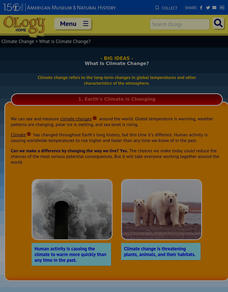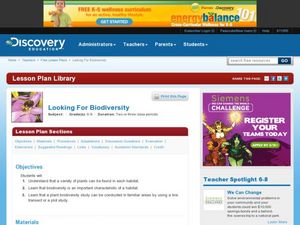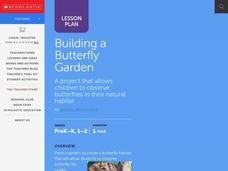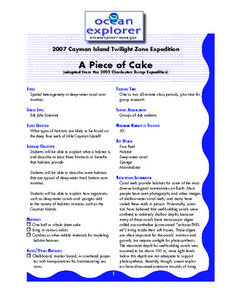Curated OER
Please Help!
Sixth graders examine the prairie food chain while designing a rescue strategy for an endangered species. They compare their strategy to that of a professional conservation expert.
Curated OER
Alligator Alley
Students identify alligator body parts, feeding patterns, habitats, and conditions necessary for their survival in the wild. They identify ways that people influence the quality of life of all creatures on Earth, including themselves and...
American Museum of Natural History
What Is Climate Change?
So many factors show that climate change has arrived. Learners read through an online resource that explains the data and the consequences of climate change. They also review strategies for slowing or even reversing the global influence.
Curated OER
Marine Field Trip to Whytecliff Park
Students study the intertidal habitat, tidal pools and the organisms that live in them. In this aquatic ecosystems activity students take a field trip and experience first hand the local seashore environment.
Curated OER
Biomes: Freshwater & Seawater
Learners observe organisms behavior and adaptations. In this biomes lesson plan students conduct fieldwork to determine water quality and answer questions about the differences between different habitats.
Curated OER
Biosphere
Students examine the basic biosphere and its components. In this ecology activity students complete several experiments including designing a system that is balanced to sustain life.
Curated OER
Interdependence and adaptation
Students use keys to identify animals and plants in local habitats. Students are asked if they remember what the word habitat means. Students make a list of three different local habitats and brainstorm animals and plants they might...
Curated OER
Different Environments
Students read literature selection, discuss habitat, divide habitats into different categories such as water, soil, and land, list animals that live in each habitat, and describe habitats using descriptive words in vocabulary list.
Curated OER
Looking for Biodiversity
Students explore habitats and see that there are a variety of plants that can be found and that biodiversity is an important characteristic. For this biodiversity lesson students complete an activity that explains how to perform a...
Curated OER
Radical Raptors
Students define raptor, explain why raptors are important, describe unique physical characteristics of various types of raptors, and explain life cycle of raptors. Students then play Habitat Game, describe food and hunting habits of...
Curated OER
Butterfly Report
In this biology learning exercise, students draw or trace an accurate picture of a butterfly. Then they complete the information related to their butterfly's classification and list the habitats where they are likely to be found....
Curated OER
Who's New in the Deep Sea?
Learners examine the methods and technology that scientists use to study the deep sea and other remote environments. In this ocean habitats lesson students make observations about organisms from video clips, generate questions and...
Curated OER
Building a Butterfly Garden
Students plant a garden which will become the habitat for butterflies as they go through their life cycle. In this life cycle lesson, students grow plants that attract butterflies and feed caterpillars in order to observe the...
Curated OER
From Egg to Butterfly
Students use file folders and art supplies to create a visual presentation of the life cycle of a butterfly. In this life cycle lesson plan, students read books about the life cycle and view the life cycle with in class habitats.
Curated OER
Critters in Your Own Backyard
Students identify various animals and their habitats, as well as their specific traits In this animal habitat lesson, students list animals they've seen in their backyard. Students select one animal and do research. Students then answer...
Curated OER
Camouflage, Protection, & Adaptations—Who am I?
Students explore ocean animal adaptations. For this animal adaptations lesson, students examine how different ocean animals use adaptations other than camouflage to protect themselves.
Curated OER
Maintaining Strong Fisheries
Students play a game about the life cycle of a blue crab in order to witness the causes of changes in the crab population and discuss what a resource manager could do to keep a stable crab population. Students then create a game titled...
Curated OER
Stream Table
Students explore channelization, riparian habitats and soil erosion to find out about the aquatic habitats in Iowa. In this aquatic habitats lesson, students define important terms and read an article about pollution. ...
Curated OER
A Piece of Cake: Ocean Communities
Students explain habitats. In this model based lesson plan students create a model to help describe a habitat that is typical of deep-water. Students will describe how organisms such as coral and sponges add to their habitat.
Curated OER
A Piece of Cake
Students examine life under the sea to discover coral gardens and microhabitats. They demonstrate learning by creating an edible marine ecosystem with a sheet cake, icing, and different candies.
Curated OER
Habitat Sunprints
Students recognize various habitats and where they are found. In this habitat sunprints lesson, students observe the contents of habitats and record what the sunprint might represent. Students use blueprint...
Curated OER
Biodiversity in an Estuary
Students investigate the biodiversity in estuaries. In this estuary lesson plan, students use Google Earth to explore the Rookery Bay National Estuarine Research Reserve. They produce a biodiversity concept map and portray the life of a...
Curated OER
Water, Water Everywhere (Pond Animals)
Second graders examine the characteristics of animals who live in a pond environment. In groups, they describe the various stages in the life of a frog and identify the characteristics of other pond animals. Using this information,...
Curated OER
Happy in My Habitat
Fourth graders create animal habitats and explain the biomes they live in. In this habitat lesson, 4th graders recognize the basic needs of animals, characteristics of animals differences and places where they live. Students...

























